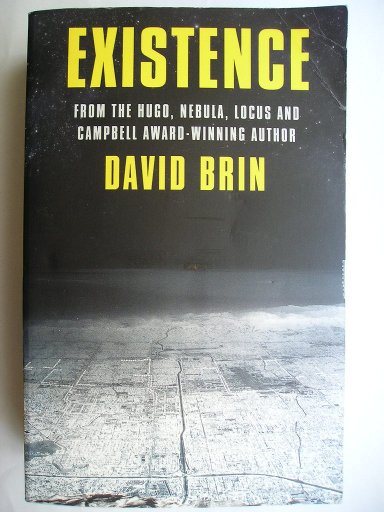
The novel “Existence” by David Brin was published for the first time in 2012.
An object found in space appears to be a very sophisticated alien communication device. In fact it contains an alien intelligence that offers human beings to become part of a kind of federation of several species. The alien messenger promises many technological benefits but the many questions he’s asked cast more shadows than lights on its offer.
As if the situation weren’t complicated enough, in a flooded Shanghai Peng Xiang Bin finds an object that looks like the alien communication device. Actually, it contains an intelligence as well, however it accuses the other one of trying to deceive humans. In a world more and more on the brink of chaos, it’s essential to find the truth.
In 1950, physicist Enrico Fermi expressed the paradox that bears his name thinking about the possibility of the existence of alien civilizations and wondering where they are if they really exist. David Brin addressed this problem in a novel that brings together many ideas obout the future of humanity. “Existence” is evidently the result of years of pondering and various parts have been published separately over the years.
The beginning of “Existence”, in which there are the first contact with aliens but different messengers carry conflicting messages, in some ways looks like the beginning of the novel “The Forge of God” by Greg Bear. The interesting thing is that Bear stated he discussed many years ago with David Brin about the possible reasons why humans haven’t been contacted by alien civilizations.
David Brin develops the plot of “Existence” in a manner quite different from Greg Bear’s “The Forge of God”. In both cases, however, the Earth’s governments try to figure out the intentions of the aliens, in “Existence” to determine whether humanity would have an advantage in joining a group of alien species.
According to David Brin, a contact with alien species will happen indirectly, via space probes containing intelligences who can communicate with the civilizations they reach. One of the underlying themes of “Existence” concerns the way in which some of these messengers communicate their offerings. The fact that another messenger accuses the first of wanting to deceive humans starts a long and arduous search for the truth.
You can’t say that the messengers lie to humans but in some cases they act as sellers who are trying to highlight the positive sides of the products they want to sell. Their human contacts must ask the right questions to get enough information to make a decision.
However, this is a completely new situation so it’s hard to know the right questions but it’s also difficult to interpret correctly the answers of the alien messengers. Thus the work of the human representatives is long and complex because it relies on subtleties that can make a big difference in the interpretation of their communications with the messengers.
On this background there are several subplots concerning several characters and among them there are various inserts with pieces of pseudo-essays and articles. The result is very complex because “Existence” is a novel based on ideas. Let’s be clear, there’s action and there are twists until the end but the impression is that the ideas are the most important element.
Honestly David Brin’s choice makes the narration fragmented and I understand that for some readers this may be a problem, also because characters come and go and the subplots come together only in part in the course of the novel.
Normally, such a structure is a flaw in a novel, but in “Existence” there’s a common basis of ideas that unites all its parts and can give them a homogeneity. To analyze all the ideas contained in this novel it would take an encyclopedia because David Brin ponders on the disasters avoided by humans and the ones that could still happen.
One of the main characters in “Existence” discovers dolphins whose intelligence has been increased through genetic engineering. Their “uplift” is the basis of the most famous David Brin’s series, in this novel is just one of many ideas.
The most important ideas concern humanity’s chances of survival and the possible changes that await humans in the future. David Brin describes a world that’s really chaotic and yet he shows some optimism. The chances of something bad happening are high but already in another of his great novels, “Earth”, Brin wrote that:
In a large enough universe, even unlikely things can happen.
As unlikely as a tiny ball of star-soot taking upon itself, one day, to say aloud, to one and all, “I am.”
In this sort of flood of ideas that overwhelm the reader page after page, the characters are often a bit sacrificed. Of the many that appear in “Existence” only some of the main characters are really developed, occasionally even in the later parts of the novel where the story leaps forward in time.
If it wasn’t yet clear, “Existence” is an idea-oriented novel so it’s not easy to read. In my opinion, however, it’s incredibly stimulating in the way in which it describes a future that’s really possible and a plausible first alien contact that’s both intriguing and disturbing.
“Existence” is the kind of novel I like so my judgment is somehow positively biased towards it. Readers who prefer character-oriented stories could instead be disappointed with a novel like this one. I don’t know whether it this can be the ultimate masterpiece of an author who has written many extraordinary novels but I think it’s one of recent years’ best novels.
If you like novels that contain deep thought-provoking speculations about the future and ideas in abundance, David Brin is definitely an author you already appreciate and “Existence” is a a must-read for you.

